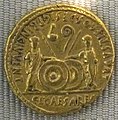Princeps iuventutis
As princeps iuventutis ("first of the youth") or - more rarely - princeps iuventum , the designated successors of the princeps were referred to during the Roman Empire .
The expression first appears in the late republic. This is how Marcus Tullius Cicero called the Cato the Younger , whom he valued , and Titus Livius knows him as the name of young riders or leading young men from communities without Roman citizenship. As a true and exclusive title but was only after the establishment of the Principate by Augustus introduced. This organized the knightly young teams (and partly the mature young members of the nobility ) as iuventus and let his grandchildren and presumptive successors Gaius and Lucius Caesar 5 and 2 BC respectively. To explain to principes iuventutis . This was also propagated in an extensive series of coins that showed the two of them with shields of honor and spears.
Hardly any specific powers of attorney seem to have been associated with the rank of princeps iuventutis , but Germanicus , Tiberius Gemellus , Nero , Domitian and Commodus , among others , were particularly emphasized by this title.
This custom was also retained when it became customary since 68 AD to elevate the presumptive successor - the Roman Empire was not formally hereditary - to sub-emperor ( Caesar ) or even co-ruler ( Augustus ) . Since Septimius Severus , the relationship between the princeps iuventutis and the knights ( equites ) disappeared . During the imperial crisis of the third century , many soldier emperors almost regularly conferred the title on relatives who seemed too young to be given imperial powers. In the 4th century, however, the title slowly fell out of use, most recently it is attested for Valentinian II .
literature
- Walter Beringer : Princeps iuventutis. In: Paulys Realencyclopadie der classischen Antiquity Science (RE). Volume XXII, 2, Stuttgart 1954, Sp. 2296ff.
- Marietta Horster : Princeps Iuventutis. Concept, realization, representation. In: St. Benoist et al. (Ed.): Figures d'empire, fragments de mémoire. Pouvoirs et identités dans le monde romain impérial IIe s. av. n. è - VI s. de n. è. Lille 2011, pp. 73-103.
- Hans Volkmann : Princeps iuventutis. In: The Little Pauly (KlP). Volume 4, Stuttgart 1972, column 1140.


